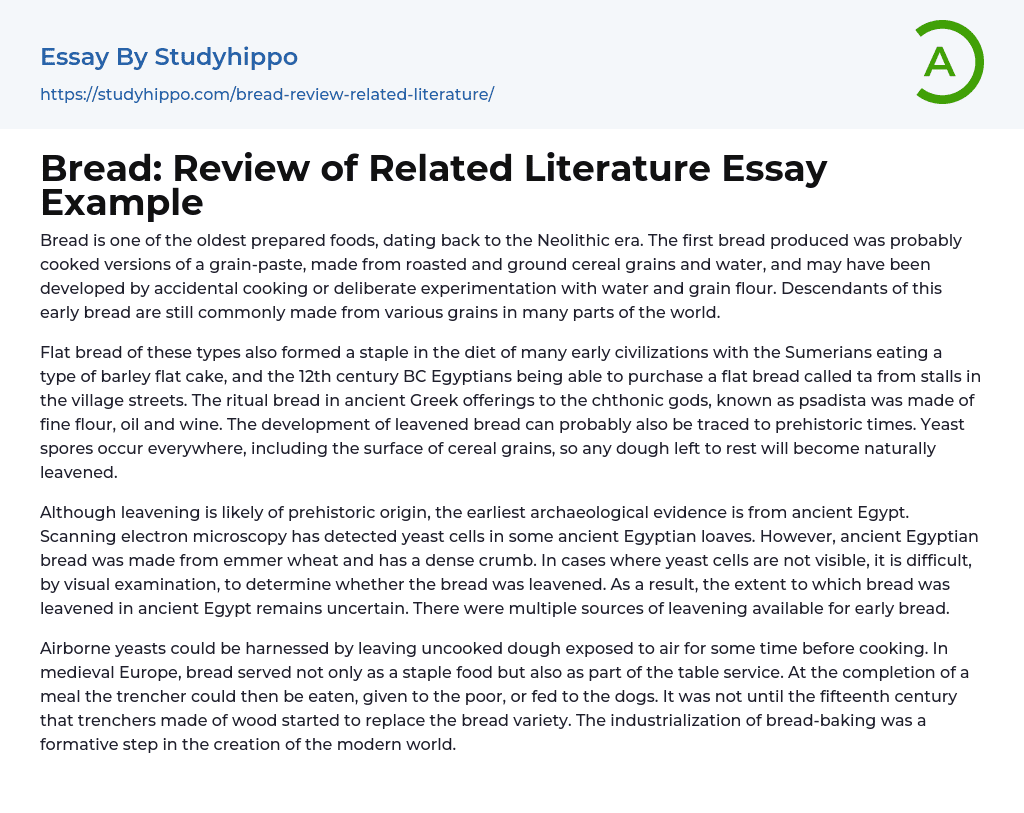Bread is one of the oldest prepared foods, dating back to the Neolithic era. The first bread produced was probably cooked versions of a grain-paste, made from roasted and ground cereal grains and water, and may have been developed by accidental cooking or deliberate experimentation with water and grain flour. Descendants of this early bread are still commonly made from various grains in many parts of the world.
Flat bread of these types also formed a staple in the diet of many early civilizations with the Sumerians eating a type of barley flat cake, and the 12th century BC Egyptians being able to purchase a flat bread called ta from stalls in the village streets. The ritual bread in ancient Greek offerings to the chthonic gods, known as psadista was made of fine flour, oil and wine. The development of leavened bread can probably also be trace
...d to prehistoric times. Yeast spores occur everywhere, including the surface of cereal grains, so any dough left to rest will become naturally leavened.
Although leavening is likely of prehistoric origin, the earliest archaeological evidence is from ancient Egypt. Scanning electron microscopy has detected yeast cells in some ancient Egyptian loaves. However, ancient Egyptian bread was made from emmer wheat and has a dense crumb. In cases where yeast cells are not visible, it is difficult, by visual examination, to determine whether the bread was leavened. As a result, the extent to which bread was leavened in ancient Egypt remains uncertain. There were multiple sources of leavening available for early bread.
Airborne yeasts could be harnessed by leaving uncooked dough exposed to air for some time before cooking. In medieval Europe, bread
served not only as a staple food but also as part of the table service. At the completion of a meal the trencher could then be eaten, given to the poor, or fed to the dogs. It was not until the fifteenth century that trenchers made of wood started to replace the bread variety. The industrialization of bread-baking was a formative step in the creation of the modern world.
- Book Summary essays
- Metaphor essays
- Reader essays
- Rhyme essays
- Literary devices essays
- Villain essays
- Books essays
- Genre essays
- Literary Criticism essays
- Writer essays
- Protagonist essays
- Simile essays
- Poem essays
- Book Report essays
- Book Review essays
- Greek Mythology essays
- Plot essays
- Tragic Hero essays
- Coming of Age essays
- Play essays
- Rhetoric essays
- Rhetorical Question essays
- Translation essays
- Understanding essays
- Reason essays
- Character essays
- Letter essays
- American Literature essays
- Literature Review essays
- Utopia essays
- Poetry Analysis essays
- Dante's Inferno essays
- Between The World and Me essays
- Incidents in The Life of a Slave Girl essays
- Flowers for Algernon essays
- Myth essays
- Everyday Use essays
- Boo Radley essays
- Genesis essays
- Richard iii essays
- Alice in Wonderland essays
- On the road essays
- Ozymandias essays
- The Nightingale essays
- Holden Caulfield essays
- Animal Farm essays
- 1984 essays
- A Hanging essays
- Shooting An Elephant essays
- A Tale Of Two Cities essays




